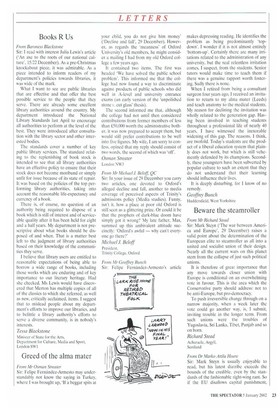Greed of the alma mater
From Mr Osman Streater Sir: Felipe Fernandez-Arrnesto may understandably not know the saying in Turkey, where I was brought up, 'If a beggar spits at your child, you do not give him money' (Decline and fall', 29 December). However, as regards the 'meanness' of Oxford University's old members, he might consider a mailing I had from my old Oxford college a few years ago.
It contained two items. The first was headed 'We have solved the public school problem'. This informed me that the college had now found a way to discriminate against products of public schools who did well in A-level and university entrance exams (an early version of the 'unpolished stone v. cut glass' thesis).
The second informed me that, although the college had not until then considered contributions from former members of less than £50,000 worth the administrative bother, it was now prepared to accept them, but would still prefer contributions to be well into five figures. My wife, I am sorry to confess, opined that my reply should consist of two words, the second of which was 'off'.
Osman Streater
London NW3
From Mr Michael J. Beloff, QC Sir: In your issue of 29 December you carry two articles, one devoted to Oxford's alleged decline and fall, another to media coverage of perceived aspects of Trinity's admissions policy (Media studies). Funny, isn't it, how a place at poor old Oxford is still seen as a glittering prize. Or could it be that the prophets of dark-blue doom have simply got it wrong? My late father, Max, summed up this ambivalent attitude succinctly: 'Oxford's awful — why can't everyone go there?'
Michael J. Beloff
President, Trinity College, Oxford
From Mr Geoffrey Bunch Sir: Felipe Fernandez-Armesto's article makes depressing reading. He identifies the problem as being predominantly 'topdown'. I wonder if it is not almost entirely 'bottom-up'. Certainly there are many irritations related to the administration of any university, but the real relentless irritation comes, I suspect, from the students. Senior tutors would make time to teach them if there was a genuine rapport worth fostering. Sadly there is none.
When I retired from being a consultant surgeon four years ago, I received an invitation to return to my alma mater (Leeds) and teach anatomy to the medical students. My reason for declining the invitation was wholly related to the generation gap. Having been involved in teaching students throughout a professional life of nearly 40 years, I have witnessed the inexorable widening of this gap. The reasons, I think, are twofold. Today's students are the product of a liberal education system that plainly does not work, but which is still vehemently defended by its champions. Secondly, these youngsters have been subverted by popular culture to such an extent that they do not understand that their learning should influence their lives.
It is deeply disturbing, for I know of no remedy.
Geoffrey Bunch
Huddersfield, West Yorkshire






















































 Previous page
Previous page